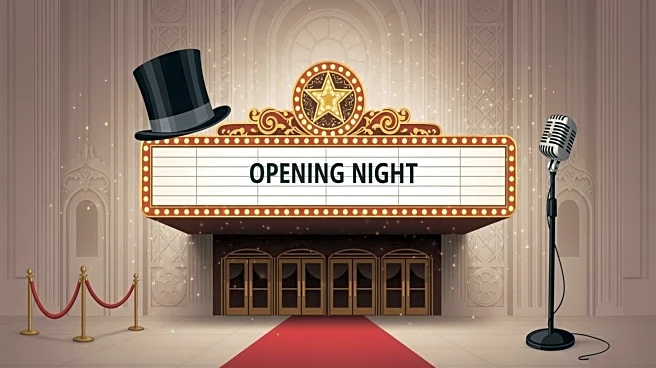What's Happening?
The Broadway revival of Ragtime opened at Lincoln Center Theater's Vivian Beaumont Theater, directed by Lear deBessonet. The event was attended by notable figures such as Audra McDonald, Brian Stokes Mitchell,
Rachel Zegler, Danielle Brooks, Phillipa Soo, Jasmine Cephas Jones, and Hillary Clinton. The production, adapted from E. L. Doctorow's 1975 novel by Terrence McNally, Stephen Flaherty, and Lynn Ahrens, explores themes of American identity and social change at the turn of the 20th century. The cast includes Joshua Henry, Caissie Levy, Brandon Uranowitz, Nichelle Lewis, Colin Donnell, and Shaina Taub. DeBessonet, inspired by the original production, aims to convey the epic and intimate qualities of the story through music and performance.
Why It's Important?
The revival of Ragtime is significant as it brings a classic narrative of American history and social dynamics to a contemporary audience. The themes of racial and social intersectionality resonate with current societal issues, offering a reflective lens on progress and challenges. The presence of high-profile attendees underscores the cultural importance of the production, potentially influencing public discourse on diversity and inclusion in the arts. The revival also highlights the enduring relevance of theater as a medium for storytelling and social commentary, contributing to the ongoing dialogue about America's past and future.
What's Next?
The success of Ragtime's opening night may lead to extended runs and increased interest in similar productions that tackle historical and social themes. The theater community and audiences might anticipate further revivals or new works that explore American identity and diversity. The production could inspire discussions among cultural leaders and policymakers about the role of the arts in addressing societal issues. Additionally, the cast and crew may engage in promotional activities to broaden the reach and impact of the show.
Beyond the Headlines
Ragtime's revival not only entertains but also educates audiences about historical narratives and their contemporary implications. The production may influence future theatrical works to incorporate diverse perspectives and stories, fostering a more inclusive cultural landscape. The ethical considerations of representing historical events and figures in modern contexts could spark debates about artistic responsibility and authenticity. Long-term, Ragtime's success might encourage investment in theater as a tool for social change and education.









